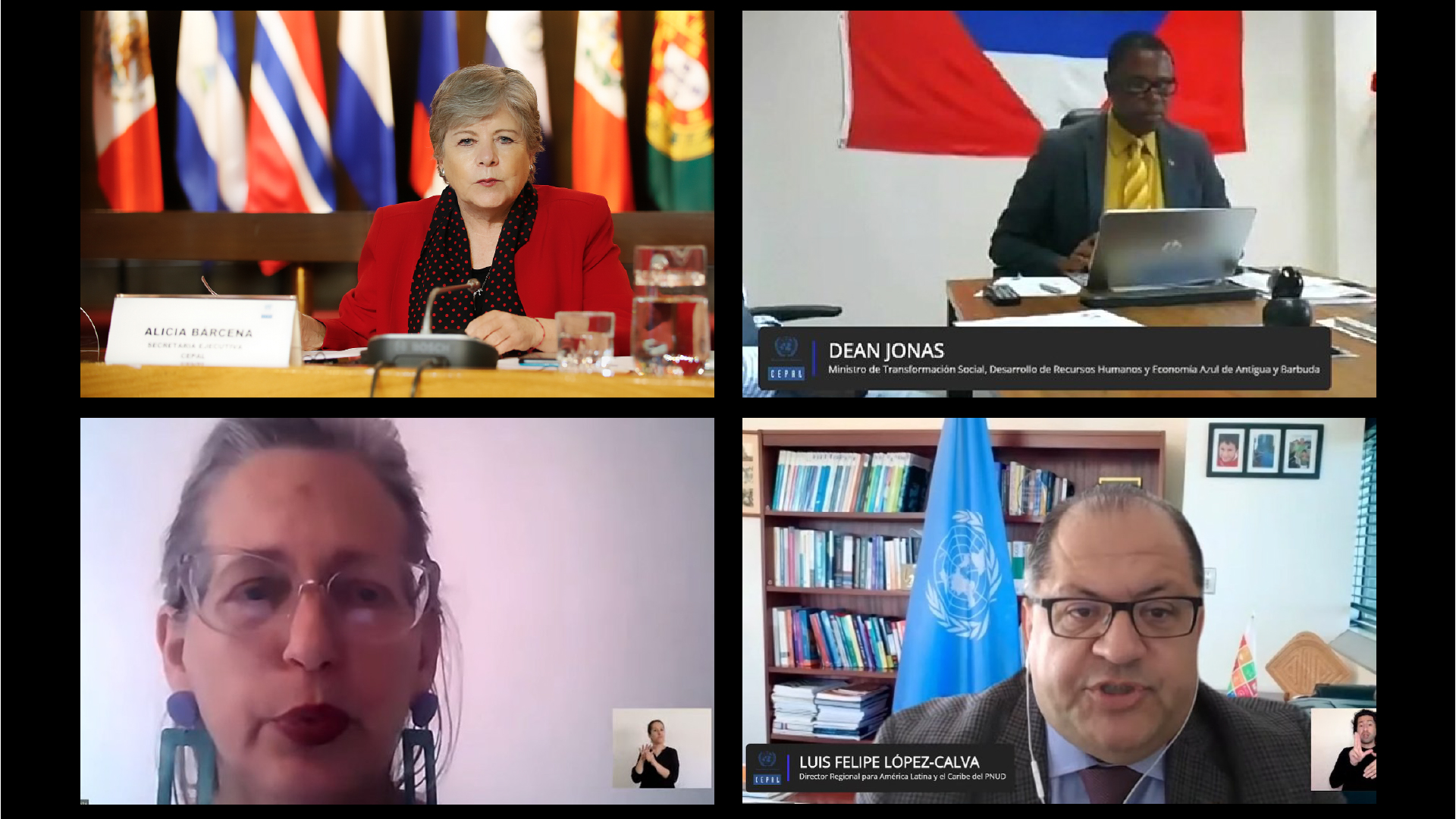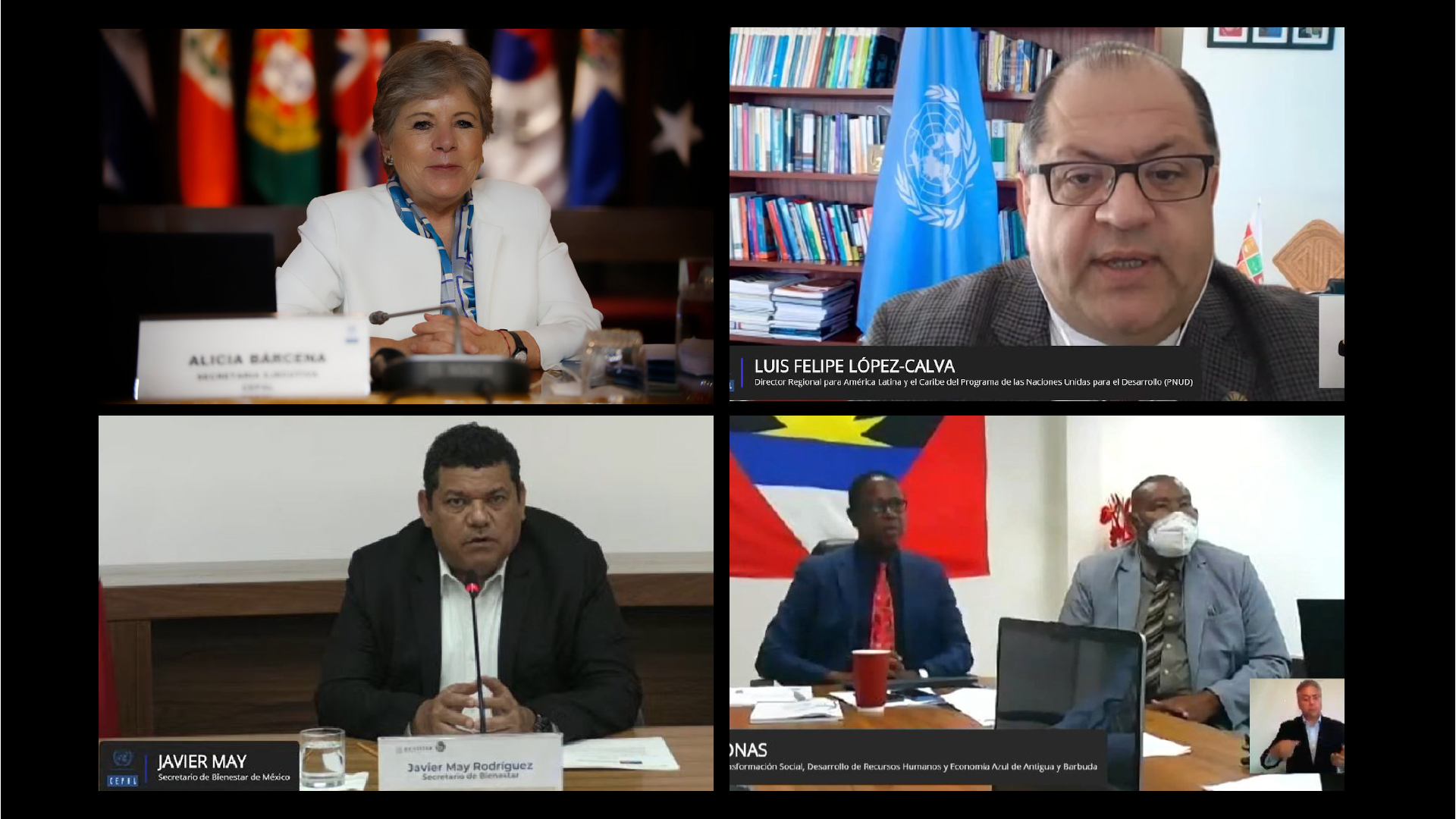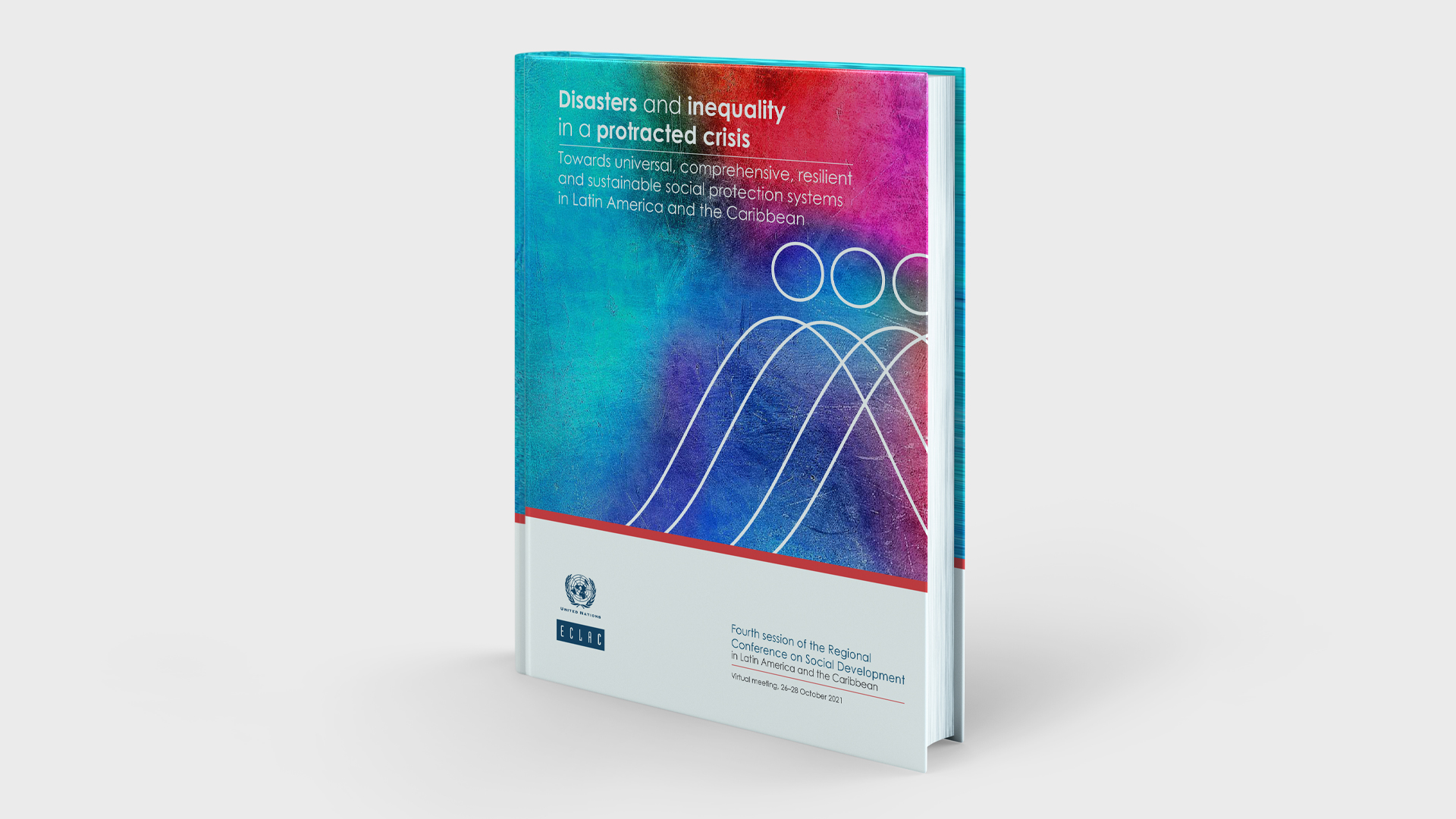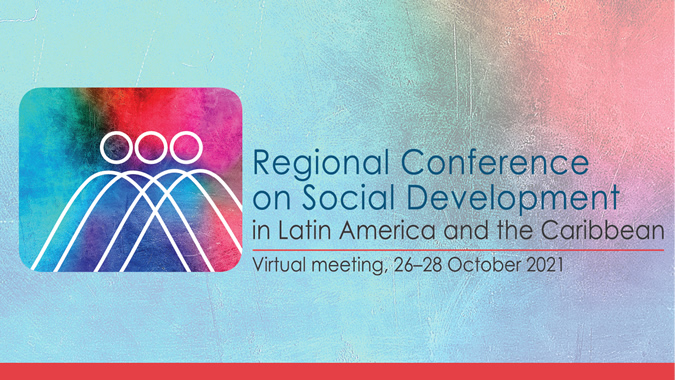Latin American and Caribbean Countries Reaffirmed the Importance of Safeguarding the Region’s Progress on Social Development and Preventing Setbacks amid the Crisis Unleashed by the Pandemic
Work area(s)
Today marked the close of the Fourth Session of the Regional Conference on Social Development in Latin America and the Caribbean, organized by ECLAC in conjunction with the United Nations Development Programme (UNDP), and with support from the Government of Antigua and Barbuda.

Countries from Latin America and the Caribbean reaffirmed today the importance of putting people and their rights at the center of development, along with safeguarding the progress on social development achieved by the region and preventing setbacks amid the economic and social impacts of the COVID-19 pandemic, at the close of the Fourth Session of the Regional Conference on Social Development in Latin America and the Caribbean, organized by the Economic Commission for Latin America and the Caribbean (ECLAC) in conjunction with the United Nations Development Programme (UNDP) and with the support of the Government of Antigua and Barbuda.
In the resolutions agreed upon at the meeting – which was inaugurated on Tuesday, October 26 – the delegates posed “the importance of coordinating social protection systems with disaster risk management policies to strengthen the capacity for mitigation, prevention, response and adaptation and to advance in synergies that will improve the efficiency and resilience of institutions and the population.”
The sustained creation of productive employment and decent work and the development of universal, comprehensive, sustainable and resilient social protection systems are indispensable for achieving a transformative recovery in the region, the countries emphasized.
The delegates further indicated that multilateralism and cooperation are the critical means for making headway on implementation of the 2030 Agenda for Sustainable Development in the region, including its social dimension, and they highlighted the contribution of the Regional Agenda for Inclusive Social Development (approved during the Third Session of the Conference, held in Mexico in 2019) to this process.
The closing session of the meeting, which took place virtually, featured the participation of Dean Jonas, Minister of Social Transformation, Human Resource Development and the Blue Economy of Antigua and Barbuda; Marcela Browne, from Fundación SES in Argentina, participating on behalf of civil society; Luis Felipe López-Calva, Regional Director for Latin America and the Caribbean of UNDP; and Alicia Bárcena, Executive Secretary of ECLAC.
“We have to improve resource coordination and mobilization and institutional capacities in order to develop universal, comprehensive and resilient social protection systems” that can stand up to disasters and future health crises, Minister Jonas said, sharing some of the priorities his country has while at the helm of the Regional Conference for the next two years, including the collection and harmonization of data, the strengthening of social protection systems, psychosocial and mental health support for the population, and assistance for persons with disabilities and people who are unemployed. Limited fiscal space is one of the region’s main challenges at this time, the Minister acknowledged. Many countries face high levels of indebtedness and unemployment, along with difficulties in key sectors such as tourism, he said.
“We are concluding this gathering with renewed conviction regarding the urgent need to promote new social contracts for the region that would collectively manage risks. To that end, governments have an ally in UNDP for moving towards that renovation of social compacts and the establishment of innovative social protection policies that would respond to current challenges,” said Luis Felipe López-Calva, UN Assistant Secretary-General and UNDP Regional Director for Latin America and the Caribbean.
Representing civil society was Marcela Browne, from Fundación SES in Argentina, who indicated that “it is essential to move forward on universal, comprehensive, sustainable and redistributive social protection systems, with universal and solidarity-based public services that promote the prevention, containment and mitigation of disaster impacts using a transformative recovery approach, aligned with the 2030 Agenda.”
Alicia Bárcena, ECLAC’s Executive Secretary, reaffirmed the importance of this intergovernmental space for exchanging policy experiences and lessons learned from COVID-19. She also sustained that “recent disasters in the region, particularly the pandemic, have shown the need to put universal social protection at the center of national disaster risk management strategies” in order to foster social and institutional resilience.
Disasters in our region are occurring as structural elements, and not extraordinary circumstances, due to their effects on economies and the threat they pose to achieving the 2030 Agenda’s Sustainable Development Goals (SDGs), the senior international official stated.
“We can’t keep doing the same thing and expect different results,” Bárcena stressed, calling for forging new social and fiscal compacts to underpin policies. She also urged for Social Development Ministries and Secretariats to get more actively involved in climate change policies, and she pinpointed numerous challenges, including that of developing a vulnerability index in the region.
“Moving towards a transformative recovery with equality and sustainability, which puts decent work and social investment at the center, is a necessary path to sustainable development,” she concluded.
The Presiding Officers of the Regional Conference is now composed of Antigua and Barbuda as Chair and the Bahamas, Barbados, Chile, Costa Rica, Dominica, Paraguay and Uruguay as Vice Chairs.
Participating in the meeting were delegates from 29 of ECLAC’s Member States and 9 of its associate members, along with representatives from 12 United Nations organizations, 5 specialized organizations and 15 intergovernmental organizations. They were joined by 151 members of civil society, 67 people from the academic sector and 172 participants from other sectors.
Related event

Fourth session of the Regional Conference on Social Development in Latin America and the Caribbean
The fourth session of the Regional Conference on Social Development in Latin America and the Caribbean is being organized by the Economic Commission for Latin America and the Caribbean (ECLAC), the…
Related content

Latin America and the Caribbean Needs New Social and Fiscal Compacts to Transform and Provide Financial Sustainability to its Social Protection Systems, with the Aim of Confronting the Current Overall Context of Disasters
Authorities from Antigua and Barbuda and Mexico along with representatives of ECLAC and UNDP participated in the inauguration of the Fourth Session of the Regional Conference on Social Development in…

ECLAC Calls for Articulating Social Protection Systems with Disaster Risk Management Policies in Pursuit of a Transformative Recovery with Equality and Sustainability in the Region
The United Nations regional organization presented a document on this issue in the framework of the Fourth Session of the Regional Conference on Social Development in Latin America and the Caribbean,…

Desastres y desigualdad en una crisis prolongada: Hacia sistemas de protección social universales, integrales, resilientes y sostenibles en América Latina y el Caribe
Presentación de Alicia Bárcena, Secretaria Ejecutiva de la CEPAL, en la Cuarta Reunión de la Conferencia Regional sobre Desarrollo Social de América Latina y el Caribe.

Social Development Authorities from Latin America and the Caribbean Will Discuss Disasters, Inequality and Social Protection Systems in the Current Context of Protracted Crisis
On October 26-28, the Fourth Session of the Regional Conference on Social Development in Latin America and the Caribbean will take place, under the organization of ECLAC, the Government of Antigua…
Subregional headquarter(s) and office(s)
Country(ies)
- Latin America and the Caribbean
-
Antigua and Barbuda
Contact
Public Information Unit
- prensa@cepal.org
- (56 2) 2210 2040

